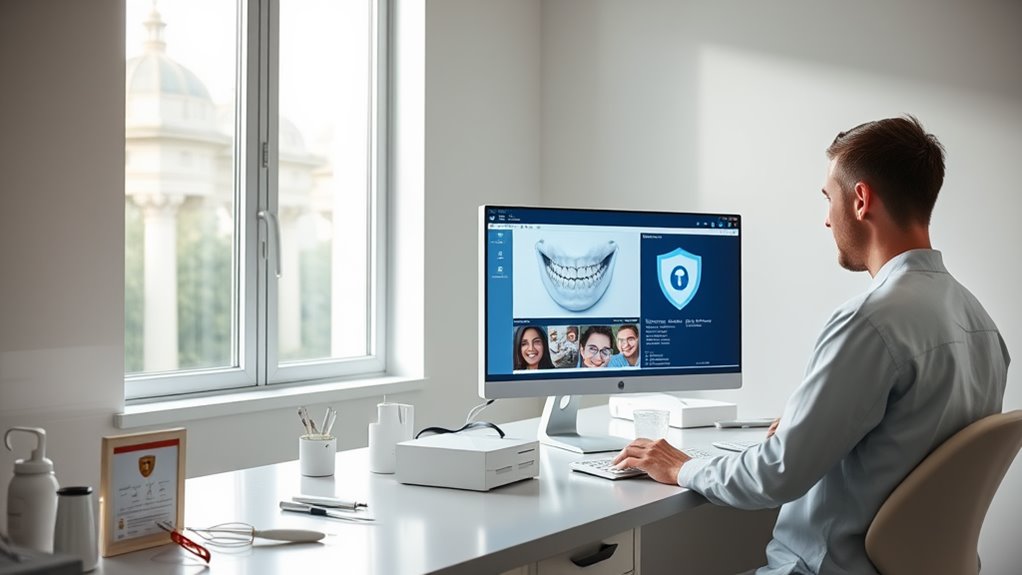HIPAA-Compliant Digital Workflows for Dental Lab Communication
Maneuvering the digital landscape of dental lab communication can feel like walking a tightrope, where one misstep could jeopardize sensitive patient data. You need a workflow that not only streamlines operations but also complies with HIPAA regulations to protect patient health information. By exploring various tools and strategies, you can enhance communication while minimizing risks. What specific digital solutions can help maintain compliance and efficiency, and how can they transform your practice? If you need assistance with this important topic, feel free to contact us. We can connect you with experts who can provide tailored solutions for your dental practice.
Importance of HIPAA Compliance
Understanding the importance of HIPAA compliance is crucial for dental labs to protect sensitive patient information effectively. As a dental lab professional, your commitment to safeguarding protected health information (PHI) not only guarantees confidentiality and security but also establishes a foundation of patient trust.
Patients must feel confident that their health data is handled with the utmost care, allowing for open communication and fostering a collaborative atmosphere between them and healthcare providers. Moreover, the legal implications of non-compliance can be severe. Violations can result in substantial financial penalties, ranging from thousands to millions of dollars, which could threaten the stability of your practice.
Beyond financial repercussions, non-compliance exposes your organization to legal disputes and the potential for reputational damage, both of which can have long-lasting effects on your ability to serve patients effectively. Ensuring adherence to the Privacy Rule is essential for maintaining the trust and confidence of both patients and healthcare providers.
Digital Workflow Automation Benefits
As dental labs prioritize HIPAA compliance, embracing digital workflow automation presents significant advantages that enhance both operational efficiency and patient care.
By leveraging digital innovation, you guarantee high-quality and precise dental restorations through CAD/CAM systems and advanced imaging technologies. This automation streamlines processes, reducing the time and costs associated with producing dental solutions while facilitating better communication between labs and clinics. Digital solutions enhance traditional dental services and simplify the restoration process through workflow automation software utilizing CAD/CAM technology.
Workflow optimization is critical; automated systems align every step of the process, improving overall efficiency and minimizing errors. Real-time access to digital scans and collaborative tools further enhances project efficiency, allowing for quicker turnaround times and a higher volume of cases without sacrificing quality.
Ultimately, these benefits contribute to improved patient experiences and outcomes. Shorter appointments and higher success rates lead to greater satisfaction, fostering stronger relationships with your patients.
Additionally, the elimination of physical impressions mitigates cross-contamination risks, guaranteeing a safer environment. By adopting digital workflows, you're not only enhancing your operational capabilities but also demonstrating a commitment to exceptional patient care and compliance with regulatory standards.
Secure Patient Data Transfer
Guaranteeing secure patient data transfer is paramount in maintaining HIPAA compliance and protecting sensitive information in dental labs. To achieve this, you should utilize secure messaging platforms and encrypted files for transmitting protected health information (PHI). By implementing password protection and encryption for all electronic communications, you can greatly reduce the risk of unauthorized access.
It's essential to restrict access to these secure communication channels to authorized personnel only. This involves using unique identifiers and strong passwords, along with multi-factor authentication to enhance security. Regularly reviewing and updating access privileges ensures that only the necessary staff can handle sensitive data.
When exchanging information, verify patient identities and recipient details to prevent accidental disclosure. You must also guarantee compliance with HIPAA regulations by obtaining written consent from patients before sharing their PHI. Signing Business Associate Agreements (BAAs) with third-party entities that handle patient data is another critical step in maintaining compliance.
Lastly, conducting regular risk assessments and audits will help you identify potential vulnerabilities and reinforce your commitment to protecting patient information in your dental lab operations. Furthermore, adherence to HIPAA standards is crucial for developing a culture of privacy and security within your practice.
Integration With Laboratory Management
Integrating laboratory management software into your dental lab operations is crucial for enhancing efficiency and maintaining compliance with regulatory standards. Effective lab software integration facilitates automated submission and management of lab prescriptions, allowing for real-time tracking of all patient lab prescriptions within a single platform. This streamlined prescription management greatly reduces errors and delays, guaranteeing timely delivery of appliances while alleviating frustrations associated with manual workflows.
Moreover, the integration of cloud-based case management systems, such as EasyRx, enables immediate transmission of impression and order data, fostering real-time collaboration among dentists, dental technicians, and labs. By allowing discussions during patient visits, you can enhance communication and improve overall operational efficiency. Additionally, implementing HIPAA-compliant texting solutions can further secure patient information during communication.
Automated workflows further lessen administrative burdens, enabling staff to focus on higher-value activities. Compliance and security features, such as encrypted data storage and secure file transfer protocols, guarantee adherence to HIPAA regulations and protect patient information.
Case Management and Tracking
Effective case management and tracking are fundamental components of a streamlined dental lab operation. By utilizing lab case tracking modules, you can log and monitor each lab-related task—from sending impressions to receiving completed restorations. This level of tracking not only reduces the risk of lost or delayed lab work but also enhances practice efficiency through better workflow optimization. Additionally, implementing comprehensive data capture allows for detailed tracking of orders from multiple labs, ensuring no important information is overlooked.
It's vital to maintain detailed case documentation, including tooth numbers, shades, sent and received dates, and associated costs. Designating a single dental assistant to manage all lab cases fosters consistency and accountability.
Embrace lab management portals to eliminate paper slips, enabling quicker case processing. Scheduling should align with the dental lab's turnaround times, typically 7-10 working days, guaranteeing that cases aren't booked until the lab product is confirmed.
Quality control is paramount; check lab cases 2-3 days before the patient's appointment to assure compliance with practice standards. Utilize digital communication tools to streamline updates and minimize miscommunication, reinforcing your commitment to providing exceptional patient care while adhering to HIPAA regulations.
Payment and Financial Management
Payment and financial management play a critical role in the operational success of dental labs, directly impacting cash flow and the overall efficiency of services. By integrating with payment processors, you can offer various payment options, such as credit cards, ACH transfers, and mobile payments, to facilitate timely settlements from dental clinics.
Automated payment handling reduces manual labor considerably—up to 80%—by managing follow-ups on late payments and notifying clients about outstanding bills in real-time. Additionally, implementing structured billing systems can further streamline workflows and reduce the time spent on paperwork.
Moreover, advanced financial reporting capabilities provide valuable insights into your monthly revenue and client activity, enabling you to optimize collection efforts. Integration with accounting software, like QuickBooks, enhances your ability to generate detailed reports, allowing for better cash flow management.
Ensuring compliance with regulations such as HIPAA and PCI DSS is paramount, as it protects both patient health information and client credit card data. By implementing strict access controls and maintaining signed Business Associate Agreements (BAAs), you uphold the integrity of financial data.
To summarize, effective payment and financial management strategies empower dental labs to serve clients better while ensuring regulatory compliance and operational efficiency.
Communication and Collaboration Tools
In today's fast-paced dental environment, staying connected with patients and dental clinics is essential for maintaining smooth operations and guaranteeing quality care. Effective communication and collaboration tools play a pivotal role in achieving this goal. When considering your tool selection, prioritize HIPAA-compliant platforms that uphold patient privacy and adhere to strict regulations.
Utilizing various communication channels, such as secure text messaging, email, and patient portals, enhances patient engagement while maintaining compliance. Text messaging can be employed for appointment reminders and quick inquiries, while email serves well for non-urgent communications.
Patient portals provide secure access to dental records, though user experience should be considered to avoid frustration. Implementing collaboration strategies such as two-way texting and group messaging fosters real-time interaction with patients, improving overall satisfaction. Additionally, incorporating automated reminders can significantly reduce no-shows, ensuring patients stay on track with their appointments.
Furthermore, verify that any third-party tools utilized are backed by Business Associate Agreements (BAAs) to uphold HIPAA standards. By thoughtfully selecting communication tools and implementing robust strategies, your dental practice can enhance patient relationships while safeguarding sensitive information.
Ensuring Data Encryption Protocols
Data encryption is a critical component of safeguarding electronic Protected Health Information (ePHI) in dental labs. To guarantee compliance with HIPAA requirements, you must implement robust encryption standards for both data transmission and storage. Adhering to these protocols not only protects patient information but also maintains your practice's integrity.
Here are three essential measures to contemplate:
- Data Transmission: Encrypt all data transmission using TLS 1.2. This high-level encryption is nearly impossible to breach and is crucial for protecting ePHI during communication.
- Data Storage: Verify all stored ePHI is encrypted with AES 256-bit encryption. This standard meets HIPAA requirements and should be consistently applied across all storage solutions, including those provided by third-party vendors. Additionally, most modern dental websites interact with ePHI, necessitating compliance.
- Business Associate Agreements: Obtain signed BAAs from all companies involved in ePHI storage and transmission. These agreements outline responsibilities and guarantee that all parties maintain the necessary data protection standards.
Regular Security Audits and Assessments
Maintaining robust encryption protocols lays a solid foundation for securing electronic Protected Health Information (ePHI), but it's only one aspect of an extensive compliance strategy. Regular security audits and assessments are vital for vulnerability identification and risk mitigation within your digital workflows.
Conducting thorough risk assessments allows you to pinpoint potential vulnerabilities in your systems and evaluate the likelihood and impact of any breaches. You should document your findings and recommendations meticulously, guaranteeing that they inform corrective actions aimed at mitigating identified risks.
Auditing compliance with HIPAA regulations is equally important; review your policies and procedures to verify they align with HIPAA standards. Verify that all staff members are well-trained on compliance practices and that proper protocols for using and disclosing Protected Health Information (PHI) are in place.
Additionally, confirm that business associate agreements (BAAs) are established where necessary and audit communication protocols with dental laboratories for compliance. Business associates must implement appropriate safeguards to protect health information shared during these communications.
Future Trends in Dental Lab Communication
As the landscape of dental lab communication evolves, embracing technology becomes essential for enhancing efficiency and patient care.
Future trends will likely focus on telehealth integration and improved patient engagement, guaranteeing more dynamic interactions between dental practices and labs.
Here are three key trends to watch:
- Seamless Digital Workflows: Expect increased reliance on digital platforms for real-time updates and communication. This will streamline processes, reduce turnaround times, and enhance patient satisfaction. Additionally, the implementation of CAD/CAM technology will further improve the accuracy and efficiency of dental restorations.
- Advanced Customization Tools: Innovations in 3D printing and AI diagnostics will enable highly customized dental prosthetics tailored to individual patient needs. This precision enhances treatment outcomes and fosters trust.
- Enhanced Data Security: With the rise of digital workflows, robust security measures will become paramount. Compliance with HIPAA regulations will guarantee that patient data remains protected while facilitating improved communication.
Frequently Asked Questions
What Are the Penalties for Non-Compliance With HIPAA Regulations?
Non-compliance with HIPAA regulations can lead to significant fines and penalties, depending on violation severity. Compliance audits may reveal deficiencies, resulting in corrective action plans and increased scrutiny, impacting your practice's reputation and financial stability.
How Can Dental Labs Ensure Staff Are HIPAA Trained?
"An ounce of prevention is worth a pound of cure." Guarantee your staff training includes ongoing education on HIPAA regulations, tailored to roles, utilizing interactive methods to reinforce compliance and protect patient information effectively.
What Types of Patient Information Are Considered PHI?
Patient information considered PHI includes identifiers like names, addresses, and Social Security numbers, alongside electronic records such as medical histories and laboratory results. Protecting this data is essential for maintaining patient confidentiality and trust.
Can Patients Access Their Records Through Secure Portals?
Imagine a digital bridge connecting you to your health records. Through secure portals, you can engage with your information, utilizing secure messaging to guarantee patient engagement while accessing your protected health information effortlessly and safely.
How Often Should We Review Our HIPAA Compliance Policies?
You should review your HIPAA compliance policies annually, especially after compliance updates or significant organizational changes. Regular audits help identify vulnerabilities, ensuring your practice consistently meets HIPAA standards and protects patient information effectively.
Conclusion
In the ever-evolving landscape of dental lab communication, embracing HIPAA-compliant digital workflows isn't just a best practice—it's a necessity. By prioritizing secure messaging, encrypted transfers, and robust management systems, you're not only safeguarding sensitive patient information but also enhancing operational efficiency. If you're feeling overwhelmed by the complexities of these regulations or need guidance on implementing secure workflows, don't hesitate to reach out to us for assistance. Our expert help can save you time, reduce stress, and ultimately improve your dental practice. As you navigate this regulatory terrain, remember that staying proactive with security measures and embracing future trends will guarantee you maintain patient trust and uphold your professional integrity in an increasingly digital world.





